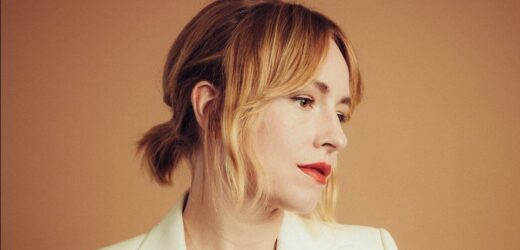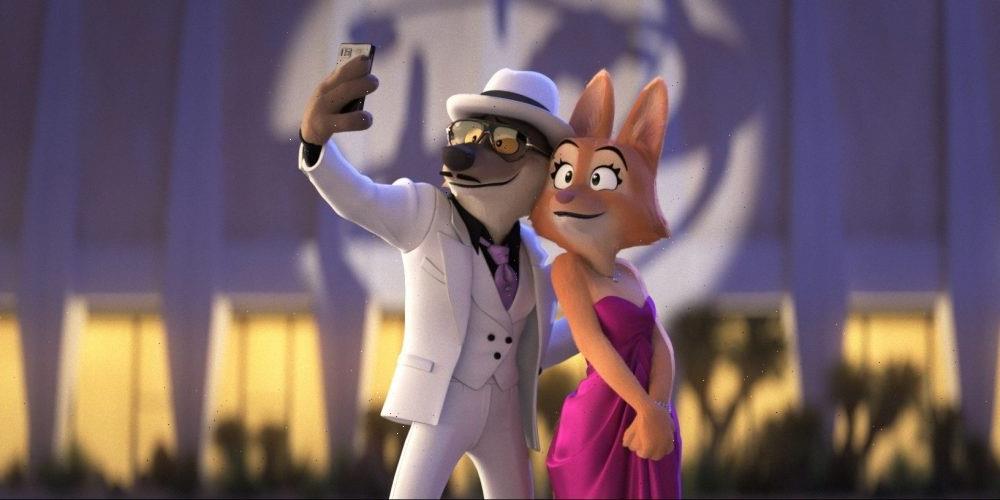Spoiler Alert: Do not read if you haven’t watched “all the sauces,” the fourth episode of Season 3 of “Barry,” streaming now on HBO Max.
The first two seasons of Alec Berg and Bill Hader’s “Barry” followed the title character (played by Hader) as he barely maintained a double life between his hitman career and his newfound pursuit of acting. The character was able to keep these two worlds separate less because of any actions on his part than because of the self-absorption of the people he surrounded himself with — chief among them his love interest, Sally Reed. As played with gleefully neurotic, manic energy by Canadian actor Sarah Goldberg, Sally is convinced she was born for success, and is so single-mindedly focused on her career that she’s not paying nearly enough attention to spot any of the warning signs that Barry’s a killer.
Season 3, however, has brought forth big changes for the character, who now has a taste of success in the form of a development deal with streaming service “Banshee,” to create a television series “Joplin” based on her previous abusive relationship. At the same time, Barry has been spiraling further and further out of control, culminating in a deeply disturbing scene in which he verbally abuses her in front of her writing staff. Still laser-focused on bringing her show to life and struggling with her past trauma, Sally pushes the incident under the rug, even apologizing to Barry for making him upset.
These two disparate threads come together in “all the sauces,” which sees Sally attending the premiere for “Joplin.” After an excruciatingly awkward yet triumphant speech from Sally, during which she breaks down crying after learning the show got a 98% on Rotten Tomatoes, she gets a reality check from her young co-star Katie (Elsie Fisher), who states plainly that Barry is dangerous. The interaction gives Sally the push she needs to tell Barry that they’re over.
“There was a version where she was more self-aware earlier, and she was covering for him and lying for him a bit more, but we eventually decided that it was going to work better if her myopia and career obsession was completely eclipsing everything else — and that it took somebody else to snap her out of it,” Goldberg told Variety about the early drafts of her Season 3 arc. “I think it felt true to Sally and her tendency to be self-involved, and she also is someone who has been through huge trauma, and she immediately had a shut down, trauma response to his behavior. So the version of her lying for him was too knowing, and what felt more realistic to us was that Sally would go into rehearsed behavioral patterns of trying to please him, apologizing for him.”
Ahead of Episode 4, Goldberg talked to Variety about prepping the world’s most uncomfortable opening night speech, revealed the depths of her “Eighth Grade” fandom and teased an exploration into the more monstrous sides of Sally’s personality.
I just want to say, first off, as an entertainment journalist, I felt very called out by that press junket scene.
Are you traumatized? Are you OK?
I’m recovering. How much have you related to this surreal depiction of the TV industry that Sally has entered?
There’s a lot in the show that feels like life imitating art, and then sometimes art imitating life, and it all gets very meta and confusing. But I was excited this season that they were taking Sally to a new place where she was getting a bit of success. It just opened up so much story for us to play with. That scene in question was written by Emma Barrie, one of our writers, and it was a really fun way to poke fun at my business, and I guess your business. But I definitely drew on that deer-in-the-headlights feeling the first time I had to do a press junket and I didn’t know what to expect. With Sally, we’re always playing with the things she thinks she wants: Is it what she expects when she gets there? And we were really playing with that with this success arc. Things look like one thing from the outside, and actually it’s more complex from the inside.
There was a pretty significant time jump between seasons, at least half a year or so. How have you been thinking about Sally’s growth during that time, and what’s been going on in her and Barry’s relationship?
Barry and Sally, I’ve always said that they’re a perfect couple in that they’re totally functional in their absolute dysfunction. I think it was only a matter of time before they ended up in this bizarre domesticity together. It’s a relationship that works because he makes her feel like a star, and she is self-involved enough not to clock that he is a killer. So they’re perfect for each other. I think now she’s in this place where everything she’s actually wanted is happening, and it’s incredibly overwhelming and she’s got this kind of detachment. So in Season 2, when she’s drawing on her personal experience for her work, it’s a very fluid, creative, artistic approach. And by the time we get to the top of Season 3, she’s watching a stunt of the most horrific moment of her life, where she’s been strangled by her ex, with complete detachment. So I was really interested in that, and what happens when your art becomes commodified. And what happens when you’re someone like Sally — who doesn’t have boundaries between art and life, and uses acting as a form of therapy — now that she’s in this public arena.
It’s interesting to hear you say they’re a perfect couple, because a key part of Sally’s arc in the first four episodes is her realization that Barry is dangerous. What’s been the hardest scene in that arc for you to film?
Everyone’s been asking me about the scene where he yelled at me. Honestly, that was easy to play. Bill really went for it, and I was actually terrified. So that was easy enough. The scene where she calls him, where she gets him beer and spaghetti and takes care of him after he’s treated her that way, and actually apologizes to him on the phone, that was the hard scene to shoot. And I found that the heartbreaking one, because you’re watching somebody play out old behaviors, with no self-awareness at all. So I thought the writing was very smart in that way, and there’s ways we could have moved quicker with it, or had her immediately be defiant. And that just felt real to me, that cycle of abuse. And it’s hard to write about a cycle of abuse in a half-hour comedy, but somehow they’re managing.

How do you approach those really heavy scenes with Hader?
He and I work in a similar way in that we both like to keep things light between takes. Neither of us go into any kind of method space, which for me really helps. I like keeping things buoyant between takes, so that we’ve got the energy to be incredibly focused and go for it in the take. Obviously, if it’s something really heavy, we’ll be very respectful, but generally, I think keeping things light off screen helps when you want to do heavy stuff on screen. And honestly, I like overthinking the scenes a lot in rehearsal, so we’re really getting the scalpel in there and being microscopic about it, so that on the day, you can kind of throw it away and trust whatever comes and not think about it too hard on the day. That’s kind of the approach.
I have to ask, what was it like working with Elsie Fisher? I’m a gigantic “Eighth Grade” fan.
Me too! We were all huge “Eighth Grade” fans. When we went to the Critics Choice Awards years ago, Elsie Fisher was there winning an award for “Eighth Grade,” and I was at a table with Alec and everybody, and we were fanning out over her performance. And we courted her, we were desperate to have her on the show, and when she said yes, we were so delighted. She was so lovely. She’s so smart. She’s so wise beyond her years. She is so well-prepared. She’s funny. I felt very lucky that I had her as a partner in crime this season. And not to sound maternal about it, but I was just so proud of her. She was really bold in her performance, she had so many good ideas. We were all a little intimidated at times. Like why is the 18-year-old the one who knows everything? A bit like her character. She’s a special one. She’s gonna go on to great things, I have no doubt. She just moved to New York, so now I’m like the nervous mom constantly texting her, “How’s it going? How’s the apartment? Is everyone being nice to you?” But she’s great. She doesn’t need me at all. I think it’s the other way around.
While we’re talking about Episode 4, we need to touch on the speech Sally makes during the premiere. What is she thinking about during that long, very awkward pause?
We went through multiple iterations of what that speech was going to be. There was a version where her arrogance took over, and the thrill of being successful took over in real time. And we felt it wasn’t right, and what felt right in that moment was she’s trying to be this thing. She’s trying to be someone who doesn’t care about reviews, she wants to be an artist, but she gets fed this piece of information that she has wanted to hear her entire life, the second before the most public moment she’s ever been in in her entire life. So what you’re watching is someone having an incredibly private moment in public. And that was what we were really going for. I watched a lot of very bizarre award acceptance speeches dating back from the ’70s to now to get some inspiration. One thing I noticed is the voice gets higher and higher, to a squeal. So I really wanted to get that in there just because I find it fascinating, why that happens.
Bill was directing and we had a great time with it. He was like “Let this moment play as uncomfortably long as you can possibly hold it before you speak again.” So that’s what we did. It was a joyful thing to get to act. It was totally bizarre. And the version before that we tried, that was a much different version of Sally, you’re getting a lot of feedback from the audience. They’re laughing at all the jokes, they’re cheering at all the cues they’re supposed to cheer at. So when we flipped it on its head and did this other version, they’re all so uncomfortable. You could feel it in the room, like you could feel people going “When is she going to speak? When is she going to make the joke?” It was as awkward and long as it played out for.
Can you name any of the speeches you watched?
You know that I can’t name any names! But just think about it. Think about the five that come to mind immediately, and you know I hit all five.
I don’t know if, when I started watching the first season, I thought Sally was actually talented. But I think she has come far as an artist over the seasons. How have you considered her trajectory and how she’s evolved?
We made a decision way back about her acting, which was my big question for the guys when I got the job: “Is Sally a good actor? How do we want to play this?” In my audition, we did the hospital scene from “Terms of Endearment,” and it’s such a great scene, but we couldn’t get the rights [for the show]. I thought Sally would have been given that scene in acting class and she would have YouTubed Shirley MacLaine, and then imitated her. And not badly, but she wants it to be so good, but it’s coming from the wrong place. And the guys were like, “She has to be good, if she’s not good, we’ve got nowhere to go.” So we decided she’s talented, but it’s often misguided. She can be terrible in a scene, but equally she can pull it together and find something good in the scene. Which is pressure for me, because you’ve got to have your own barometer of “This is bad, this is good,” and we’re not our best audiences. So, she’s got some talent, she just doesn’t know where to put it, necessarily. And the writing? Yeah, I mean, she’s OK. She’s no Alec Berg and Bill Hader, but she’s trying to tell the truth. I think Sally is always trying her best.
I feel in the first two seasons especially, a lot of people disliked Sally, which is pretty crazy given that she’s one of the only main cast members who isn’t a criminal. Was that something you noticed playing the character?
From the beginning, I felt like “OK, I’m the only female regular. And this is a show about men who kill people. And the feedback on the show is the female who doesn’t kill people but happens to be narcissistic and ambitious, is the one that people are allergic to.” And I was really fascinated by that, so I really wanted to push the narrative. Like, if she’s unlikable, let’s make her a monster. And that was my goal for Season 3. So Episodes 7 and 8, you will see some of Sally’s monster, I can tell you that much. I was also very clear, I am not going to be the moral barometer for this show. I’m so used to that happening to women on television, where there’s no desire to see unlikable women on TV, so the characters get pushed to be more and more likable. And I said to the guys, from Season 1, “Please, we cannot cave to this.” And they totally agreed. I didn’t want to be in the position where Sally somehow becomes the good one or the nice one. I made it very clear, she is as morally bankrupt as the rest of them. It just manifests in a completely different way. And these are all characters who are making very selfish decisions. They could all easily be better versions of themselves, but they’re choosing that instant gratification instead. And in that way, I think Sally’s quite parallel to those male characters. Even if the content of her side of the story is less extreme, the behavior is not a million miles away.
This conversation has been edited and condensed.
Source: Read Full Article


